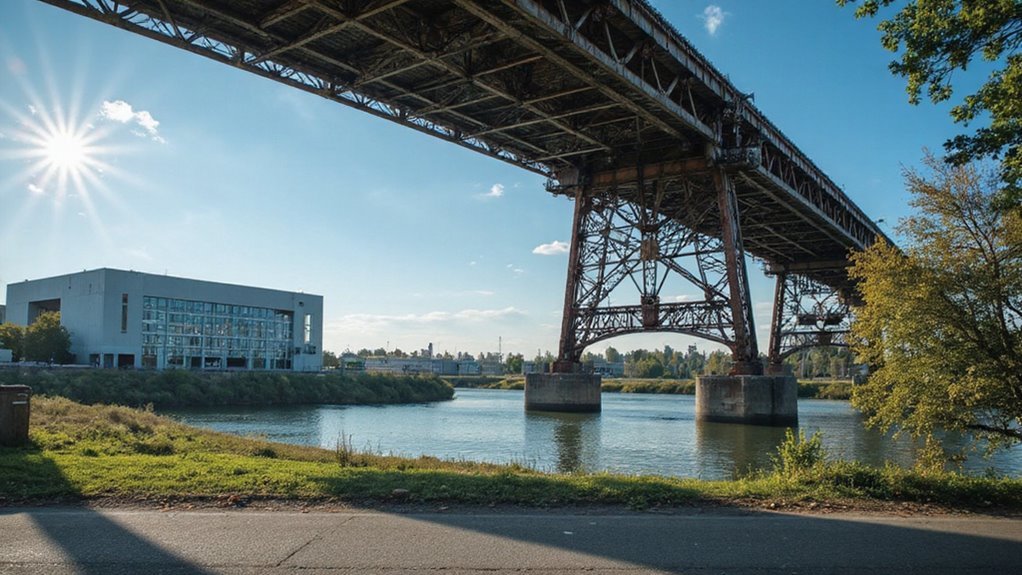You can snag quick financing for that warehouse or factory deal without waiting months for traditional banks—bridge loans fund you in just 2-4 weeks, letting you proceed before competitors do. You’ll pay higher rates (around 9-12%), but you’re getting asset-based lendingA loan secured by business assets like inventory, accounts r that focuses upon your property’s potential, not your credit score. Interest-only payments help you preserve cash during the loan term. Sure, you’ve got an 18-24 month window to refinance or sell, so you’ll need a solid exit strategyA plan for an investor or owner to sell their stake in a com. The real question is whether that competitive edge is worth the cost.
Key Takeaways
- Industrial bridge loans provide short-term financing for warehouse and factory purchases with approval in 2-4 weeks.
- Loan rates range from 9-12% and prioritize property value and exit strategyA plan for an investor or owner to sell their stake in a com over credit history.
- Interest-only payments preserve cash flowThe net amount of cash moving in and out of a business. while you secure prime industrial locations before competitors.
- Flexible underwritingThe process of assessing risk and creditworthiness before ap focuses on asset potential, enabling funding for renovation and repositioning projects.
- Typical 18-24 month terms allow time to refinance into permanent financing after property improvements.
Understanding Industrial Bridge Loans: Definition and Purpose

When you’re eyeing a warehouse deal that won’t wait around for traditional banks to finish their endless paperwork, an industrial bridge loanShort-term financing used to bridge the gap until permanent is exactly what you need. This short-term financing solution fills the gap between noticing an opportunity and securing permanent funding. Think of it as asset-based lendingA loan secured by business assets like inventory, accounts r that moves at lightning speed—your property serves as collateralAn asset pledged by a borrower to secure a loan, subject to, not your credit score’s entire history.
Industrial bridge loans are perfect for quick funding when you’re purchasing or renovating commercial real estate. Unlike traditional financing, which crawls along, these loans prioritize the property’s potential and value. You’ll find uses for an industrial bridge loanShort-term financing used to bridge the gap until permanent ranging from acquiring undervalued warehouses to financing factory renovations before refinancingReplacing an existing debt with a new one, typically with be into long-term mortgages.
The loan requirements are invigoratingly straightforward compared to conventional banks, making them ideal for investors with vision and solid exit strategies. They usually come with higher interest rates than conventional loans, but compensate with faster approvals and flexible terms.
Key Loan Terms and Eligibility Requirements
Because bridge lenders operate differently than traditional banks, you’ll find that the terms and eligibility criteria are invigoratingly straightforward—though they’re definitely not a free pass to borrow money without a plan. Instead of obsessing over your credit score, commercial lenders focus on asset-based lendingA loan secured by business assets like inventory, accounts r. Your industrial property becomes the star of the show.
| Criteria | Traditional Banks | Bridge Lenders |
|---|---|---|
| Loan Rates | 6-8% | 9-12% |
| UnderwritingThe process of assessing risk and creditworthiness before ap | Strict | Flexible underwritingThe process of assessing risk and creditworthiness before ap standards |
| Timeline | 60-90 weeks | 2-4 weeks |
Requirements for an industrial bridge loanShort-term financing used to bridge the gap until permanent center on property value and your exit strategyA plan for an investor or owner to sell their stake in a com. You’ll need a solid changeover funding plan showing how you’ll refinance or sell. Higher interest rates reflect the speed and flexibility you’re gaining. Most terms define loan agreements between 18-24 months, giving you realistic runwayThe amount of time a company can operate before running out to execute your vision. Demand for such loans is expected to grow as borrowers seek shorter-term financing options amid high rates and shifting market conditions.
Primary Use Cases for Warehouse and Factory Projects
Industrial bridge loans have carved out a specific niche in the real estate market, and they’re particularly powerful for warehouse and factory projects where timing and capital really matter. You’ll find that borrowers secure financing swiftly for acquisition scenarios where traditional lenders move at a snail’s pace. Property developers utilize this short-term financing solution to grab prime industrial real estate before competitors do.
Rapid funding for time-sensitive acquisitions lets you capitalize upon opportunities that’d otherwise slip away. Loan lenders evaluate properties based on appraisals that determine value, focusing on location and potential rather than just credit scores.
Whether you’re funding construction improvements or repositioning underutilized facilities, industrial bridge loanShort-term financing used to bridge the gap until permanent rates—typically 9-12%—become negligible compared to the risk mitigation and competitive advantage you’re gaining. These loans are a form of short-term financing that typically lasts up to a year and requires collateralAn asset pledged by a borrower to secure a loan, subject to such as the property being purchased.
Advantages of Bridge Financing for Industrial Assets

Now that you’ve got the velocity and positioning advantages for bridge financingInterim financing used to bridge a gap until a specific futu down, let’s talk about what really makes these loans shine for industrial assets—the concrete benefits that’ll actually shift the needle in your bottom line.
Bridge lenders provide capital without the red tape traditional financing demands. You’ll enjoy interest-only payments during the loan term, preserving your cash flowThe net amount of cash moving in and out of a business. when you need it most. This short-term structure makes bridge funding gaps disappear, letting real estate investors move swiftly on killer opportunities.
What’s the real revolutionary factor? These loans are ideal for repositioning or value-add projects. Unlike rigid banks, lenders focus on your property’s potential, not just your credit score. You gain the flexibility to execute your vision quickly, then refinance into permanent financing once you’ve proven the asset’s improved value. However, it’s important to be aware of the hidden risks associated with commercial bridge financingInterim financing used to bridge a gap until a specific futu to make fully informed decisions.
Risks and Important Considerations Before Borrowing
While the speed and flexibility in bridge loans are genuinely game-changing, they come with a real price tag—both literally and figuratively—that you’ve got to understand before you sign at the dotted line. An industrial bridge loanShort-term financing used to bridge the gap until permanent isn’t inexpensive. You’re looking at higher closing costsFees and expenses paid at the closing of a real estate or lo and interest rates around 11%, which can drain your profits swiftly. The urgency to close promptly can cloud your judgment, so consult financial advisors and real estate attorneys before committing. Your exit strategyA plan for an investor or owner to sell their stake in a com must be bulletproof—you’ve typically got 18 until 24 months to refinance or sell. Market downturns can trap you. Developers acquire assets all the time using short-term financing, but those who skip due diligenceComprehensive appraisal of a business undertaken by a prospe often regret it. Don’t let excitement override smart planning. Several key lenders specialize in commercial bridge loans and can offer tailored options to suit your project’s needs.





